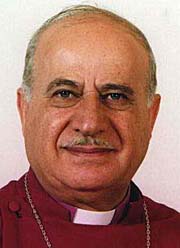— ADVERTISEMENT —

Arafat was on right track
for peace, bishop says
The Episcopal cleric from Jerusalem
visits a Kauai church today
Israelis will someday wish they had signed a peace accord with Yasser Arafat, a longtime friend of the late Palestinian president said yesterday in Honolulu.
No subsequent Palestinian leader will settle for any less than the terms of peace that Arafat agreed to in the 1993 Oslo Accords, said the Right Rev. Riah Abu El-Assal, the Episcopal bishop of Jerusalem.
![]()

![]()
Riah Abu El-Assal: Says Israel must leave occupied territories to foster harmony in Middle East
Today he takes his message of reconciliation for what he calls "the Land of the Holy One" to Christ Memorial Episcopal Church in Kilauea, Kauai, where he will preach a morning sermon and speak tonight at the 2004 King Kamehameha IV and Queen Emma Conversations.
"We're trying to reach people with the reality of the situation back home," Abu El-Assal said in an interview at a Waikiki hotel. "I, for one, continue to say and believe that only when peace comes to Jerusalem, peace will come to the world."
"Today we witness war in Afghanistan and Iraq and people speaking of wanting to bring democracy to those countries," Abu El-Assal said. "But there is no peace and there is no harmony. The world is not a safer place than it used to be four years ago, five years ago."
Abu El-Assal believes the key to Middle East peace is implementation of United Nations resolutions of 1967 that require Israel to withdraw from occupied territories of the Gaza Strip and the West Bank.
"When we recognize the right of Palestinians to self-determination, recognize the right of Palestinians to have an independent, viable Palestinian state on Palestinian soil, side by side with Israel -- only then there will be hope for the Middle East, and this hope in the Middle East will definitely reach the world at large," Abu El-Assal said.
Like Arafat, Abu El-Assal said he believes that Jewish settlers living in the West Bank and Gaza Strip could stay there under a new Palestinian state.
"What's the big deal? They can become Palestinian citizens," he said. "There are 1.3 million Palestinians who are Israeli citizens. If this is true for Palestinians, why not for Jews?"
And these two communities, Jews in Palestine and Palestinians in Israel, "could be the bridge to break down barriers and bring the communities together," Abu El-Assal said.
Born in Nazareth, Abu El-Assal said he is not impressed with the so-called "road map to peace" supported by President Bush and British Prime Minister Tony Blair. "I describe it as a map without a road and a road without a map," he said.
Any peace settlement that lasts must adequately address what will happen to Jewish settlements within a new Palestine, who will govern Jerusalem and how Palestinian refugees may return home, Abu El-Assal said.
And Middle East peace is not being helped by the wars in Afghanistan or Iraq, he said. The invasion of Iraq seems to have united historic enemies, the Shiite and Sunni Muslims, against the foreigners, Abu El-Assal said.
"Palestinians are not a bunch of terrorists, the way some wish to continue to speak about us. We have an equal life in our homeland and if people continue to speak of a land which was promised to one party, it was promised to Abraham. And the Arabs are equal children of Abraham."
— ADVERTISEMENTS —
— ADVERTISEMENTS —